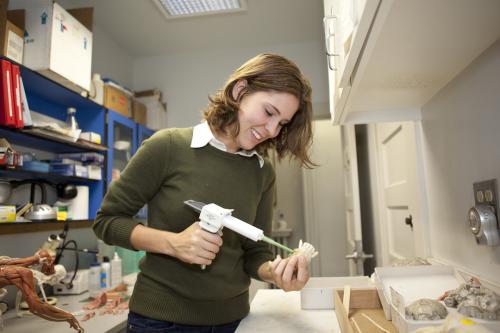Professional Development Components
A crucial part of any human paleobiology scholar’s education lies in practical experience. The Department of Anthropology infuses the academic curriculum with a variety of professional development and research components to ensure our doctoral students become well-rounded and ethical scientists.
Ethics and Professional Skills Training
HOMP 6203: Ethics and Professional Practice I, 3 Credit Hours, Year 1
In the first year of the program, all students complete a seminar on ethical dilemmas faced by all scientists in human evolutionary studies. Students learn the nuances of sharing data and ideas while protecting the rights of individual scientists and organizations. The seminar incorporates critical reading and reviewing skills, team building and management, manuscript and grant writing, oral and visual presentation skills, interview protocols, laboratory safety and preparation of research plans and curriculum vitae.
Doctoral students are also expected to attend at least one professional meeting per year, present their research at professional meetings and publish articles in peer-reviewed journals. Faculty work closely with students on their initial presentations and publications.
Laboratory Internships
HOMP 8303: Paleobiology Lab Rotation, 3 Credit Hours
During their second and third years, PhD in Human Paleobiology students complete laboratory internships in fields that complement their research interests and/or allow them to build important transferable skills. Each semester-long internship earns three credit hours. Laboratory rotations are to be determined by the student in consultation with academic advisors and will be available at laboratories both within and outside of GW. Students are encouraged to pursue laboratory rotations at GW or any institution that best serves their interests.
Public Understanding of Science Internship
HOMP 8302: Public Understanding of Science Internship, 3 Credit Hours, Completed Before End of Year 4
Scientists who study our species’ evolutionary history have a responsibility to communicate their findings to the public. The doctoral program’s internship requirement prepares students to contribute to the public’s understanding of science through outlets such as museums, TV, news and the internet.
The internship occurs before the end of the fifth year, and students may intern part-time, over a semester or during the summer. Students have helped design the content of the Human Origins Hall at the Smithsonian National Museum of Natural History, published educational articles for the National Geographic website and developed public initiatives on the understanding of race and human variation with the American Association of Anthropologists.
Sample Internship Sites
- The American Association for the Advancement of Science
- The American Association of Anthropologists
- The National Academy of Sciences
- The National Geographic Society
- National Public Radio
- Science magazine
- The Smithsonian’s National Zoo
- The Washington Post
- USA Today
Smithsonian Lectures
Years 1–5
Doctoral students assist faculty and other students participating in The Scientist Is In discussions in the Smithsonian's Hall of Human Origins. The Scientist Is In program invites museum visitors to have informal conversations with scientists in a casual setting. PhD in Human Paleobiology students must assist with the discussion at least once during their first two years in the program. During the third through fifth years, students are then prepared to lead such discussions or participate in other research outreach programming.
Journal Club
Years 1–5
The Journal Club is affiliated with the Anthropology Department’s Center for the Advanced Study of Human Paleobiology. This group of students, faculty and other researchers from across the Center’s different lab areas meets weekly to share perspectives on their developing research. Each week, several members present their latest papers and receive feedback. Students of all stages in the PhD in Human Paleobiology program are encouraged to lead Journal Club discussions as they choose. During the post-candidacy stage, students are required to lead these discussions once annually.






